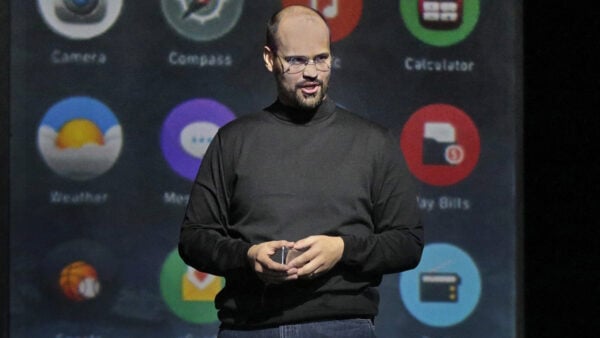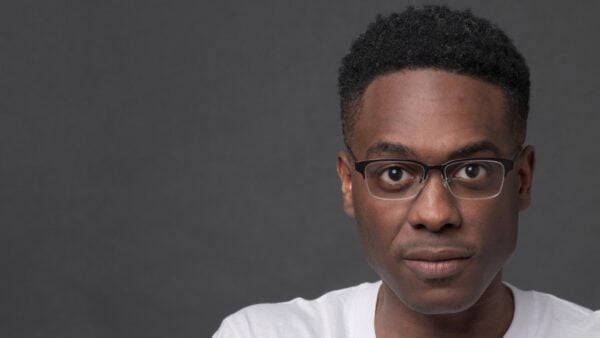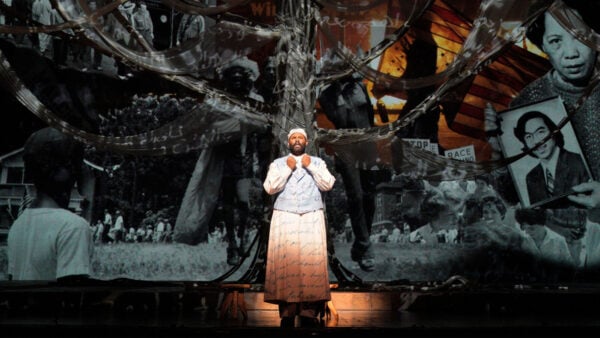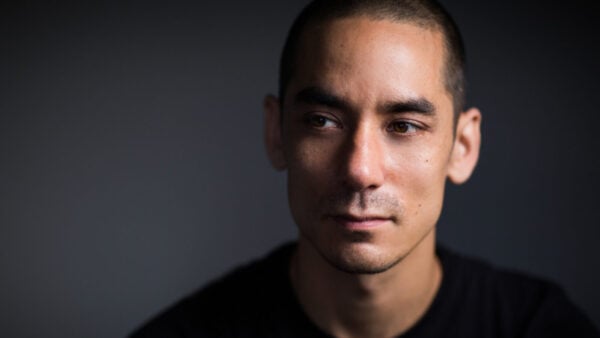
Librettist Mark Campbell
Mark Campbell has written the words to over fifteen operas to date, making him one of the most active librettists alive. In 2012, the opera Silent Night, which he created in collaboration with composer Kevin Puts, won the Pulitzer Prize in Music. While many opera lovers are more focused on composers or star singers than librettists, composers wouldn’t be able to compose anything for singers to sing were it not for the librettist to provide them with a libretto first. When Campbell visited the Windy City to attend the Chicago premiere of his opera Lucrezia produced by Chicago Fringe Opera, he spoke about his work and explained, “how do you write an opera?”
How do you write an opera?
A lot of people don’t know that with opera, the libretto is usually written first. For every opera I’ve written, the libretto has always been first. The composer demands that because they like to know where the story is going and who the characters are.
I deliver a full libretto to them, they come back and ask for changes – maybe this aria needs a few more colorful words, that sort of thing. Then they start setting the libretto to music, which the next step. I could be on call for five or six different composers at a time where they’re asking for five more words to fill out this musical phrase, that they’d like to repeat some phrase in the second act… And that’s my job. And it’s great.
Adapting source material
In my career, blessedly, I’ve created pretty much half original librettos and half adaptations. But I would even argue that when you adapt something for opera by turning an existing story into a libretto, it’s such a whole new animal that it’s not even an adaptation. It should go way beyond that.
I created The Shining with Paul Moravec based on a novel that everyone knows. Though it was adapted into a film, Stephen King didn’t originally intend that story in his book to be sung or to have it presented in two acts with an intermission. One of my jobs is to create text or words that will be sung, of course.
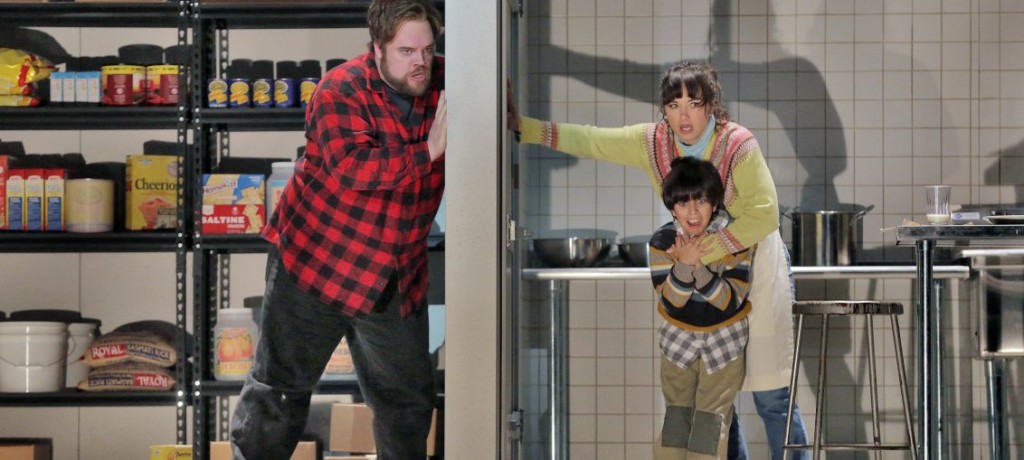
The Shining, with music by Paul Moravec and libretto by Mark Campbell, at Minnesota Opera (Photo: Ken Howard)
Stephen King had to have approval over that libretto, which he gave me very generously and very quickly. But he needed to know that I was preserving the spirit of his work. It’s something that I insist on, actually – that if I’m adapting a work, and the writer is still living, that they approve the libretto. I don’t want them to walk into the opera on opening night and say, “What have you done to my story?”
Find transformative moments
I look for a transformative moment in a character’s life because opera is – for me at any rate – the most dramatic form. You have to really give a character a reason to sing. And so I look for that moment in a character’s life where they had to make a decision to move forward or hang back. It has to be a dramatic moment.
Right now I’m writing an opera called Today It Rains about Georgia O’Keeffe and the train ride she took in 1929. She got on the train in New York and took it to Santa Fe, where her life changed. It’s going to premiere with Opera Parallèle in 2019.
When composer Laura Kaminsky came to me and said, “I want to write an opera about Georgia O’Keeffe,” my response was, “What about Georgia O’Keeffe? Her relationship with Rebecca Strand? Her relationship with Alfred Stieglitz?” And she goes, “I don’t know. That’s your job.”
And it is my job. So I did a little bit of research and I found out that she took this train ride and I went back to the composer and said, “I want to set this opera on the three-day train ride that she took with Rebecca Strand back from New York to Santa Fe.” In the case of Georgia O’Keeffe, of course, being on this train was a big deal for her. It was *the* moment.
I wrote an opera, The (R)evolution of Steve Jobs, for Santa Fe Opera, and that actually starts where the main character recognizes his own mortality in 2007 and circles back on the events of his life. That is what we call the “inciting incident,” so I look for that.
Rely on experiential research
As experiential research for Today It Rains, I myself took that same train ride that Georgia O’Keeffe took. The train goes up to New York, it goes across the lake, it goes to Chicago. Since there’s a layover, I visited the Art Institute of Chicago, which has great Georgia O’Keeffe works. But then I got back on the train and headed to Santa Fe and I wrote Georgia’s last aria, when she’s approaching Santa Fe, right on that train. I wanted to see what it felt like. And there’s a big difference in approaching Santa Fe from the train than there is from approaching it from Albuquerque. It’s not quite as romantic.
Ask for help
I’ve also written an opera called As One which is about a transgender person. I mean, talk about a trajectory or transformative moment! I was very lucky to be working with Kimberly Reid, who is transgender herself and a beautiful writer. They asked me to join the team, though I came late to the project.
I was the one who proposed that we create an original story based somewhat on Kimberly’s experiences. But then I also said, “Kimberly, you have to help me write this because I’m not transgender.” I’m gay, but that doesn’t mean that I understand a transgender person’s experiences by any means.
Every collaboration is different
My first job is to tell a story through music. My second job is to make sure the composer has all that he or she needs to tell that story. If he or she cannot write music because I have not given them the words that would inspire them, then I have to go back and change things.
Every single composer I’ve worked with – and it’s now between 35 and 40 – is different. Everyone’s needs are different. You have to identify that very early on as you enter into a collaboration. Some composers are extremely generous and won’t take credit for your work.
I’ve worked with composers who suddenly say, “Oh, yeah, well I came up with this story.” And … no, you did not write the outline. That gets me a little crazy. But then there are many who, like Paul Moravec or Bill Bolcom or Kevin Puts are like, “Mark does his job, and I’ll do mine,” and then we work together and it’s great. I really love collaboration. I really love it when it works, when both parties are mutually respectful of each other’s job.
Design as you write
I have to see every single thing that I write about. When I write, my libretto has a full set design that the director usually abandons – and that’s fine – but at least the director can see how I see it. For example, in The (R)evolution of Steve Jobs, the first draft of the libretto starts with a garage in the Jobs family home. His father gave him a workbench when he was 10 years old, and I thought that is a beautiful moment I want to start with. So it starts with a garage, the libretto specified that the four walls explode into eight video screens, and that’s precisely what happens.
But it doesn’t always work out that way. There are many surprises when you work on an opera. My set design for Silent Night was nothing like what was done at Minnesota Opera, but it worked perfectly. You get surprises and it can be wonderful. You hope that the surprises are good. I have had a few experiences when I’ve walked into a theater and someone’s done something and I’m like, “Oh god, why didn’t you ask to do that?” because I’m living, and usually the composer is too.
Make art that’s state-of-the-art
In the case of The Shining, because there are so many fantastical images in the story, I actually asked for holograms. With projections, you can achieve similar effects. In that party scene in the end of Act One, suddenly there’s just this huge spurt of blood. I did not specify that. The media designer Ben Pearcy found precisely the moment: there’s a shot fired, and the stage just explodes in red. It’s very effective because he found it in the music and it felt so organic. And I think that’s one way for projection designers to be successful – to really listen to the score and what the music is telling you to do.
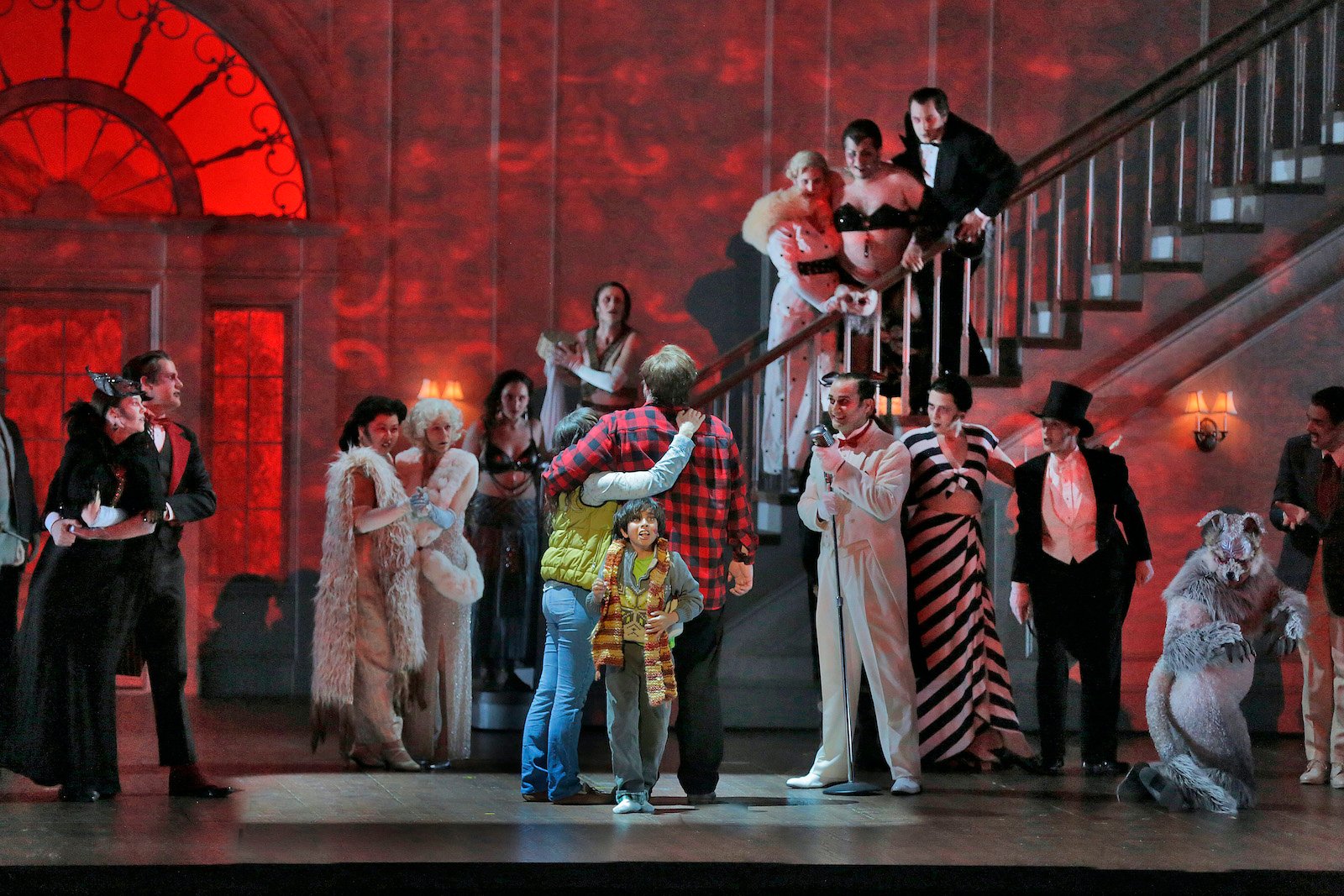
The Shining, with music by Paul Moravec and libretto by Mark Campbell, at Minnesota Opera (Photo: Ken Howard)
For the opera The (R)evolution of Steve Jobs, I specified video because the subject matter demands it. It has to be a state-of-the-art opera. It has to flash with technology, the way he did. [Hear excerpts from the score to The (R)evolution of Steve Jobs on SoundCloud.]
Get paid first
I don’t write a word until I get my first check because I’ve seen too many things fall apart. And a composer would never write a note until they got their first check. I’ve learned from them. But I come from theater where people have the attitude of, “I just want to do this – I’ll do anything.”
With musical theater, the commission fee might be something like $500, and they’ll take ten years to develop it and then maybe not do it at all. It’s just a different way of doing things. With opera, you get a really decent commission up front. They say “go,” and you start writing.
Learn to love deadlines
You have to meet deadlines. And I love deadlines because I know something needs to be delivered at a certain time. I can write really quickly. I wrote Act One of Silent Night in a few days and Act Two actually took longer because I hadn’t figured out what was going on in it. That took about a month. This libretto for Lucrezia was written in two or three days because that’s all the time I had.
The thing that can be a problem that I’ve seen is when a composer delivers their work way late – like four or five months late. That hurts everyone that comes after them: It hurts the director, the conductor, the cast. So it’s very important for composers to get their scores in on time.
Composers get generous amounts of time. If the opera is going to go up in three years, usually my libretto is due within three to six months. So it’s very important for them to get their work in on time. I’ve been in a number of situations where aren’t on time, and it really compromises the work.
Workshop, workshop, workshop!
I’ve been really fortunate to write five operas for Minnesota Opera. I love working with them. Their workshop process is really perfect. Dale Johnson there has just nailed down the way to create a new opera.
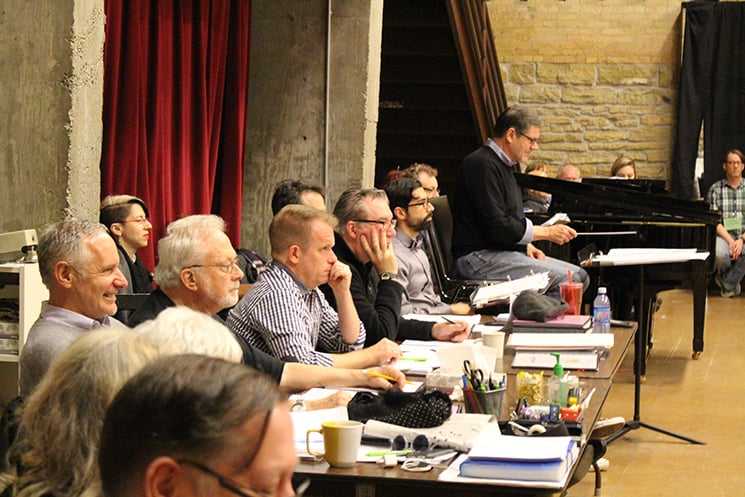
Mark Campbell observes rehearsals of Dinner at Eight at Minnesota Opera (Photo: Eric Broker)
They do one workshop for Act One, one workshop for Act One and Act Two, and then an orchestral workshop. The orchestral workshop is really important because that’s where the composer and the conductor can establish pacing. A lot of people don’t know how important pacing is in opera, especially with something like The Shining that is about suspense. You can’t let the energy drop out.
But I’ve worked for other companies as well, and we all now kind of have a model. I don’t know if they’ve all based it on the Minnesota Opera model. Typically an opera can take two to three years from the time I start working to opening night.
Be ready to make changes — fast
Honestly, while I was watching the workshop of The Shining, I thought an aria was not working. So I wrote three different versions of this to hand to Paul Moravec, the composer, so he could select what would work best for his needs. A big change can be made fast. But you don’t want that to happen – you hope that you’ve worked out all of the kinks before you go into a workshop, especially the orchestral workshop. By then your work needs to be done.
Be receptive to criticism, even after opening night
Bill Bolcom and I just had an opera open at Minnesota, Dinner at Eight, and we didn’t get the ending right. After it closed, we rewrote the ending in about five days. It’s just too bad that we didn’t do that before it happened because a number of people called us on it. I watched it a couple of times and said, “This is not working.” And then other people, respected people like Evans Mirageas at Cincinnati Opera, said, “You’ve got to do something about that ending. It fizzles.” So we rewrote it in a few days. We knew what we wanted to write, so we were able to do it quickly.
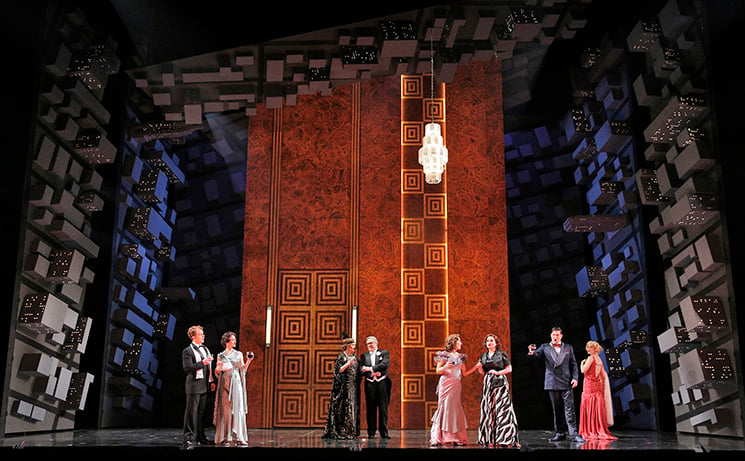
Dinner at Eight in its premiere performances at Minnesota Opera (Photo: Cory Weaver)
Keep it short and sweet
I don’t write three-hour operas. I just don’t believe in it. I don’t think we need to do that anymore. Watch, I’ll go and write some five-hour show someday… But, honestly, I don’t write long operas. So far everything I’ve written has been under two, maybe two-and-a-half hours with an intermission. Shorter, 80-to-90-minute works are expanding the form and help us find different ways of attacking a narrative.
The big impact of small opera companies
I’m fortunate in that I get to do my big operas with Minnesota and Opera Philadelphia. But then I also get to write operas like As One or Today It Rains for smaller opera companies. These smaller opera companies are crucial now in bringing in new audiences.
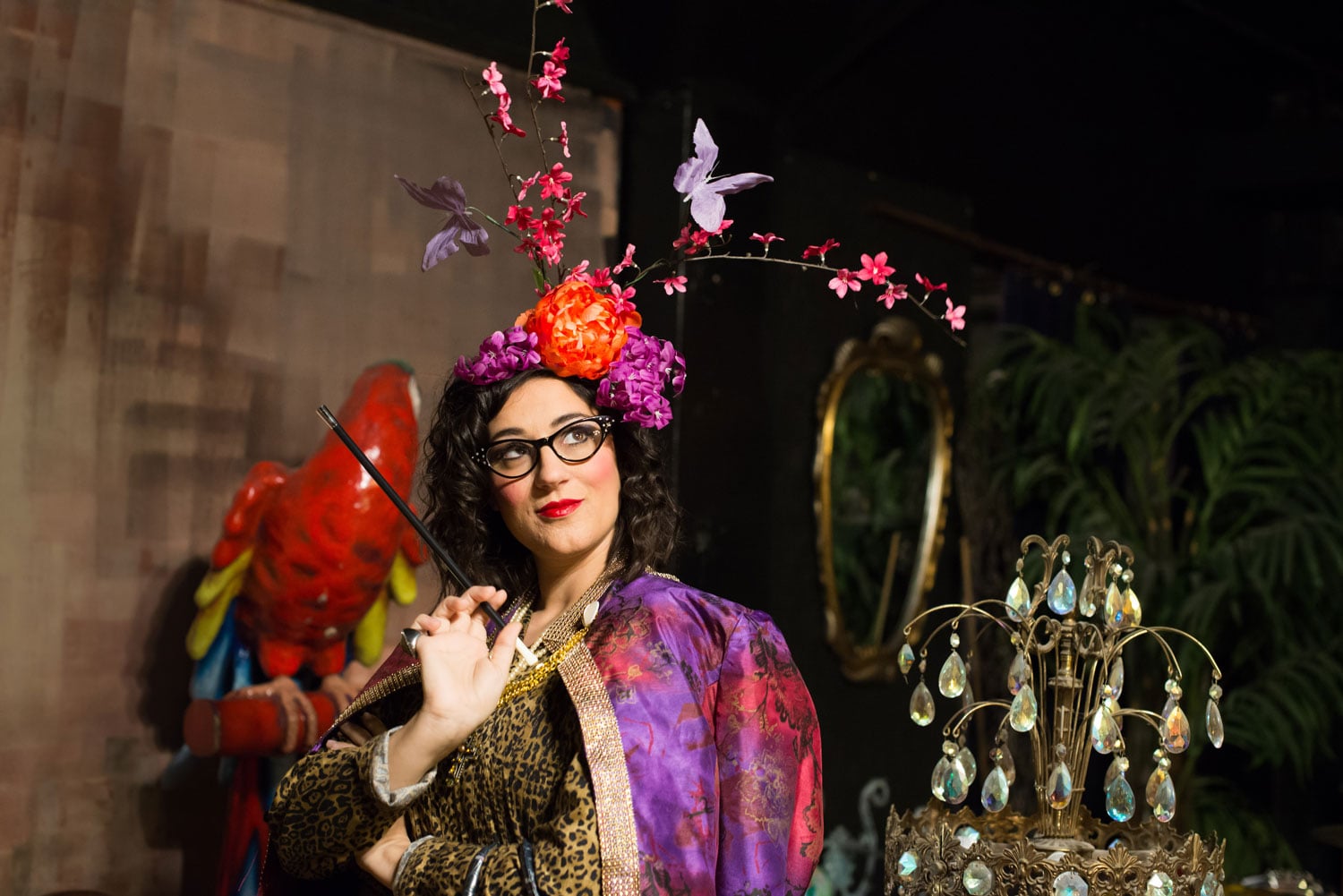
Diana Stoic as Annunciata in Lucrezia, with music by William Bolcom and libretto by Mark Campbell, in Chicago Fringe Opera's 2017 production
It’s easier for smaller opera companies to tell these stories on an intimate scale so that we can relate them to our own lives. It’s very hard for the Metropolitan Opera to tell a story that’s going to make you weep because there’s just too much distance between you and the stage. You go there for the grandeur. But I don’t think you’re necessarily touched. Smaller opera companies are helping create new audiences who may then go, “Well opera’s not so big and European and pretentious and long.”

